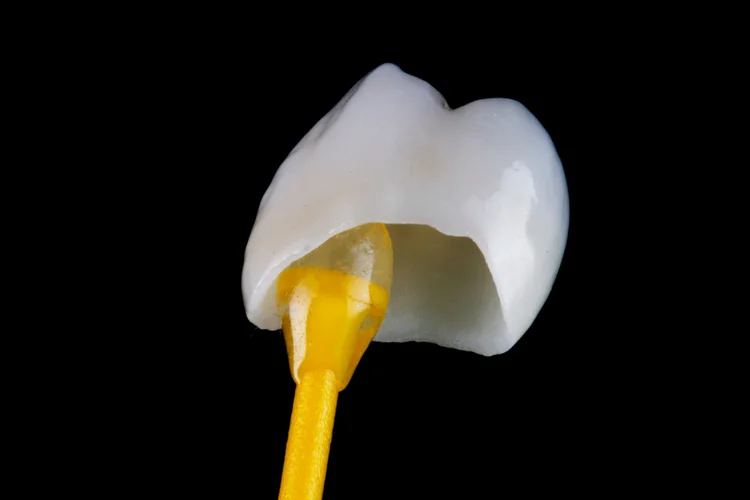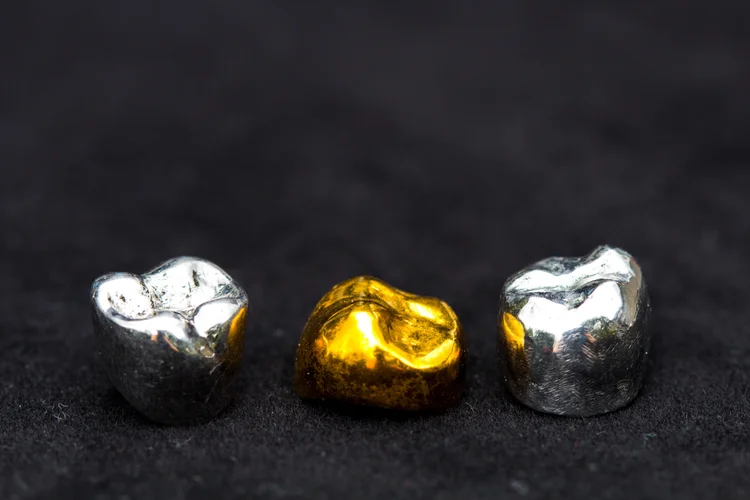Dental Crown
Information reviewed by: Dr. Tay Chih Kien, B.D.S (Singapore) | Last updated: Nov 03, 2025
| Treatment | Dental Crown |
| Purpose | To restore the strength, shape, and appearance of a tooth that is damaged, weakened, or treated with root canal therapy |
| Price | $1,199 to $1,635 NETT per unit, inclusive of GST |
| Treatment Duration | Two visits of about 1 to 2 hours each |
| How to Book | Book via WhatsApp: 9667 1828 or Email: hello@truedental.sg |
| Clinic Location | 728 Ang Mo Kio Avenue 6, #01-4228, Singapore 560728 |
What Is a Dental Crown?
A dental crown is a tooth-shaped cap that covers and protects a damaged or weakened
tooth, restoring its function and appearance.
It fully covers the visible part of the tooth above the gum line and is designed to function
like a natural tooth. Crowns can be made from different materials such as porcelain, zirconia,
metal alloys, or a combination, depending on the tooth’s location and the patient’s needs.

When Might You Need a Dental Crown?
A dental crown may be suitable for you if a tooth has lost much of its strength or structure. Common situations include:
- After root canal treatment, to protect the treated tooth from future fracture
- In cases of extensive decay where a dental filling alone cannot restore the tooth reliably
- When a large filling in a previously restored tooth has left the remaining structure too weak to function well
- For cracked, fractured, or chipped teeth that need reinforcement
- To cover a dental implant to complete the process as a replacement tooth
- For cosmetic improvement of colour, shape, or alignment
Types of Dental Crowns
Dental crowns can be made from different materials, each with specific benefits and considerations. Common options include:
- Porcelain-fused-to-metal (PFM) – Strong due to the metal core, with a porcelain coating that provides a natural appearance
- All-ceramic or porcelain – Highly aesthetic and often chosen for front teeth where appearance matters most
- Zirconia – Very durable, resistant to wear, and suitable for both front and back teeth
- Gold or other metal alloys – Extremely strong and long-lasting, but less natural in colour
- Temporary acrylic crowns – Short-term solution used while waiting for the permanent crown to be made

The most suitable crown material depends on the tooth’s location, the amount of biting force required in that area, aesthetic preferences, and cost considerations.
How Long Does a Dental Crown Last?
A dental crown typically lasts about 10 to 15 years, though the exact lifespan depends on the material used and how well it is cared for. Zirconia and metal crowns are generally more durable, while porcelain crowns may wear down sooner.
What Happens During a Dental Crown Procedure?
A dental crown procedure usually takes two visits to complete. The general process includes:
- Reshaping the tooth – Local anaesthesia is given, and the outer surface of the tooth is trimmed with a dental drill to create space for the crown. Any decayed or damaged areas are also removed.
- Taking an impression or scan – A mould or digital scan of the prepared tooth and surrounding teeth is taken so the crown can be made to fit accurately with your bite.
- Placing a temporary crown – A temporary crown is fitted over the prepared tooth to protect it while the permanent crown is being fabricated in the laboratory.
- Fitting the permanent crown – At the second visit, the crown is checked for fit, shape, and bite. Once adjustments are complete, it is bonded securely in place.

How Much Does a Dental Crown Cost in Singapore?
At True Dental Studio, we provide dental crown as part of our restorative dentistry services, with the prices as follows:
| Treatment | Price* |
|---|---|
| Consultation | $27.25 to $65.40 |
| Second Opinion Consultation | $27.25 to $65.40 |
| Porcelain-fused-to-metal (PFM) / Full Gold | From $1,199 to $1,417 per unit |
| Zirconia | From $1,417 to $1,635 per unit |
*Prices are NETT and inclusive of GST and laboratory fees.
How to Care for Your Dental Crown?
Key steps to help prolong the life of your dental crown include:
- Brushing twice daily with a fluoride toothpaste
- Flossing carefully around the crown to prevent plaque build-up
- Avoiding biting hard objects such as ice, pens, or hard sweets
- Using a mouthguard if you grind your teeth at night
- Attending regular dental check-ups to monitor the crown’s condition
Proper care lowers the risk of issues such as loosening, chipping, or decay around the edges of the crown.
How to Book a Dental Crown Appointment?
Book Dental Crown Appointment
Book NowEnquire More Through Email
Email Us NowFor additional information, please contact us via WhatsApp.
WhatsApp Us NowWhy Choose True Dental Studio?
Friendly Dentist and Team
Our team treats each and every patient to the best of our ability. This is the reason why entire families have continued their dental care with True Dental Studio for many years, from all over Singapore.
Minimal Discomfort
At True Dental, it is our commitment to ensure our patients are kept as comfortable as possible. We aim to minimize discomfort, if any, for our patients.
Affordable Treatments
We believe in pricing quality treatments at a competitive rate. We are transparent and upfront with our treatment costs.
Our Smile Scorecard
Frequently Asked Questions
Getting a dental crown is not usually painful because local anaesthesia is used to numb the tooth during preparation. Some patients may notice temporary sensitivity or mild soreness afterwards, especially when eating hot or cold foods, but this often settles within a few days. If discomfort continues or becomes more severe, it is advisable to consult your dentist for assessment.
Three common types of dental crowns include porcelain-fused-to-metal, all-ceramic or porcelain, and zirconia crowns. Porcelain-fused-to-metal crowns balance strength with a natural look, all-ceramic crowns offer the highest aesthetics and are often used for front teeth, while zirconia crowns provide durability and are suitable for both front and back teeth. Other options such as gold or temporary acrylic crowns may also be used depending on the case.
Teeth can still develop decay under a crown if plaque builds up around the margins or if oral hygiene is not maintained. The crown itself does not decay, but the natural tooth beneath it can be affected by recurrent caries or gum disease. Good daily brushing, flossing, and regular dental reviews help prevent these problems.
A dental crown can be replaced more than once if needed, but the number of times depends on the condition of the tooth and surrounding tissues. Each replacement usually involves further adjustment to the natural tooth, so repeated replacements may not always be possible indefinitely. Consulting a dentist for a proper assessment can help determine whether your crown can be replaced again or if another treatment option is more suitable.
Yes, CHAS subsidies can be used for permanent crowns, with subsidy amounts ranging from about $410.00 for Orange cardholders to $625.00 for Pioneer Generation cardholders from October 2025. From mid-2026, seniors aged 60 and above can also use Flexi-MediSave (up to $400 per year) for crowns at CHAS clinics, in addition to subsidies. As amounts vary, it is advisable to check with your dental clinic on the cost of treatment and eligibility for subsidies.
A dental crown procedure is considered a routine dental treatment rather than a major procedure. It usually requires one or two visits and involves reshaping the tooth, taking an impression or scan, and fitting the crown securely in place. While it is more involved than a simple filling, it is generally straightforward and widely performed in dental practice.
A root canal is generally considered more complex than a dental crown because it treats infection inside the tooth, while a crown restores its external structure. Both are carried out under local anaesthesia, so discomfort during the procedure is usually minimised. Some mild soreness may follow either treatment, but it often improves within a few days. It is advisable to consult a dentist for assessment of which procedure you need and what to expect in terms of comfort.
You can usually eat once the anaesthesia wears off after a dental crown procedure, but it is often advised to wait a few hours to avoid accidentally biting the tongue or cheek. With a temporary crown, softer foods are recommended to reduce the risk of dislodgement. Once the permanent crown is fitted and bonded, normal eating habits can usually resume. Always follow your dentist’s instructions on eating and drinking after a dental crown.
Placing a dental crown typically takes two visits lasting about one to two hours each. The first visit is for tooth preparation, impressions or scans, and fitting a temporary crown, while the second visit is for placing the permanent crown.
Crowns and implants serve different purposes, so one is not strictly better than the other. A crown restores a natural tooth that still has a healthy root, while an implant replaces a missing tooth with an artificial root and crown. The choice depends on whether the natural tooth can be preserved or requires extraction. Consulting a dentist can help determine whether a crown or an implant is the more appropriate treatment in your situation.
Dental crowns are usually provided by a general dentist trained in restorative dentistry, while more complex cases may involve a prosthodontist who specialises in crowns, bridges, and implants. Both can design and place crowns depending on the situation. The choice often depends on the health of the tooth, the complexity of the treatment, and whether appearance or durability is the main priority.
A root canal is not always required before placing a dental crown. Crowns can restore teeth that are structurally weak, cracked, or heavily filled without root canal therapy. However, if the pulp inside the tooth is infected or badly damaged, a root canal is usually done first to remove the infection before fitting the crown. It is advisable to consult a dentist to assess whether a root canal is necessary in your case.
A dental crown can seem costly because it involves multiple steps, high-quality materials, laboratory fabrication, and precise fitting to restore function and appearance. The price also reflects the skill, technology, and time required for treatment, especially if advanced materials such as zirconia or all-ceramic crowns are chosen. Costs vary between clinics and depend on material choice and case complexity. At True Dental Studio, we offer dental crown from $1,199 to S$1,635 NETT per unit, inclusive of GST.
A dental crown may need replacing if it becomes loose, cracked, chipped, or causes persistent discomfort. Visible gaps at the edges, decay underneath, or changes in your bite are also signs that a crown may no longer function properly. While crowns typically last 10 to 15 years, problems can occur earlier. Regular dental check-ups help monitor the condition of your crown and determine whether repair, adjustment, or replacement is required.
Dental crowns are designed as a long-term restoration but are not permanent, as they may eventually need replacement due to wear, damage, or decay at the margins. With proper care, crowns can last for many years, often a decade or more, depending on the material used. Regular check-ups and good oral hygiene play an important role in maintaining their lifespan.
Dental crowns do not commonly come off if they are well-fitted and properly maintained, but it can happen if the cement weakens, the underlying tooth structure changes, or the crown is exposed to heavy forces such as teeth grinding. Loosening is more likely with older or temporary crowns. If a crown falls off, it should be refitted or replaced promptly. Regular check-ups help monitor crown stability and detect potential issues early.
